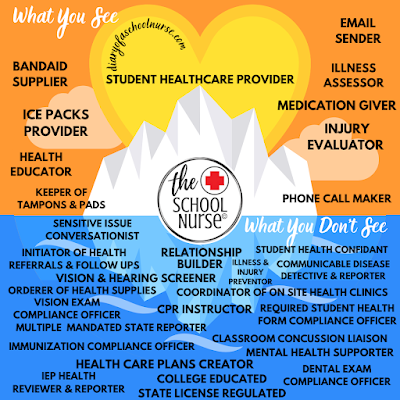Tips to Setting & Keeping Professional Boundaries for School Nurses
I don’t know about you, but this time of year always feels like a whirlwind! Between wrapping up the school year, managing last-minute health concerns, and keeping up with life outside of work, my to-do list seems never-ending. I just got back from a much-needed spring break (and trying to get back into the routine!), and I know many of you are doing the same.
With everything piling up, it’s easy to stretch yourself too thin—but setting professional boundaries is key to protecting your time, energy, and well-being. Without them, burnout can creep in fast, making it harder to provide the best care for your students. Boundaries help define your role, ensure you’re focusing on what truly matters, and create a sustainable balance between work and life. Now is the perfect time to reflect on what’s working, what’s not, and where you might need to draw the line.
5 Key Tips for Setting and Keeping Professional Boundaries
1. Review Your Job Description / Define Your Role and Communicate It Clearly
-
Make sure staff and administration understand your role as a school nurse.
-
Set expectations on what falls within your scope of practice—and what doesn’t.
-
Politely redirect requests that don’t align with your responsibilities.
Too often, school nurses are expected to take on extra tasks simply because they’re available. Clearly communicating your role helps prevent being pulled into non-nursing duties.
2. Set Limits on Your Availability
-
Establish clear working hours and avoid responding to emails or calls outside of them.
-
Let staff know when and how they should contact you for non-urgent matters.
-
Take your breaks and lunch—your time to recharge is just as important as anyone else’s.
Many school nurses struggle with stepping away, but setting limits on your availability is crucial. If you’re always available, people will always expect you to be.
3. Learn to Say No (Without Feeling Guilty!)
-
Recognize that saying no doesn’t make you unhelpful—it makes you more effective.
-
Use professional but firm language when declining extra responsibilities.
-
Offer alternative solutions if appropriate, like directing someone to the right resource.
Saying no is often uncomfortable, especially in a school setting where teamwork is key. But protecting your time and energy ensures you can focus on the students who need you most.
4. Maintain Emotional and Ethical Boundaries
-
Be mindful of becoming too personally involved in student or staff issues.
-
Keep your interactions professional and avoid taking on emotional burdens that aren’t yours to carry.
-
Protect student privacy by following FERPA and HIPAA guidelines.
It’s natural to care deeply about your students, but setting emotional boundaries prevents compassion fatigue. You can support students while still maintaining a healthy separation.
5. Advocate for Yourself and Your Profession
-
Speak up when your workload becomes unrealistic.
-
Request policy support from administration regarding boundaries.
-
Connect with other school nurses for guidance and encouragement.
Advocating for your role helps set the standard for how school nurses should be treated. The more you reinforce your boundaries, the more respect your position will receive.
Final Thoughts: Boundaries Help You Thrive
I want to create CE courses that truly support you in your school nursing role and professional boundaries are a crucial part of maintaining a healthy work-life balance. Would you be interested in a future CE course on this topic?

.png)

.png)
.png)

.png)
.png)
.png)
.png)
.png)
.png)

No comments:
Post a Comment